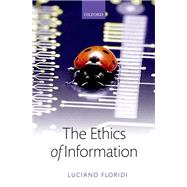
The Ethics of Information
by Floridi, Luciano-
 eCampus.com Device Compatibility Matrix
eCampus.com Device Compatibility Matrix
Click the device icon to install or view instructions
Buy New
Rent Textbook
Rent Digital
Used Textbook
We're Sorry
Sold Out
How Marketplace Works:
- This item is offered by an independent seller and not shipped from our warehouse
- Item details like edition and cover design may differ from our description; see seller's comments before ordering.
- Sellers much confirm and ship within two business days; otherwise, the order will be cancelled and refunded.
- Marketplace purchases cannot be returned to eCampus.com. Contact the seller directly for inquiries; if no response within two days, contact customer service.
- Additional shipping costs apply to Marketplace purchases. Review shipping costs at checkout.
Summary
Since the seventies, IE has been a standard topic in many curricula. In recent years, there has been a flourishing of new university courses, international conferences, workshops, professional organizations, specialized periodicals and research centres. However, investigations have so far been largely influenced by professional and technical approaches, addressing mainly legal, social, cultural and technological problems. This book is the first philosophical monograph entirely and exclusively dedicated to it.
Floridi lays down, for the first time, the conceptual foundations for IE. He does so systematically, by pursuing three goals:
a) a metatheoretical goal: it describes what IE is, its problems, approaches and methods;
b) an introductory goal: it helps the reader to gain a better grasp of the complex and multifarious nature of the various concepts and phenomena related to computer ethics;
c) an analytic goal: it answers several key theoretical questions of great philosophical interest, arising from the investigation of the ethical implications of ICTs.
Although entirely independent of The Philosophy of Information (OUP, 2011), Floridi's previous book, The Ethics of Information complements it as new work on the foundations of the philosophy of information.
Author Biography
Luciano Floridi is Professor of Philosophy at the University of Hertfordshire--where he holds the Research Chair in Philosophy of Information and the UNESCO Chair in Information and Computer Ethics--and Fellow of St Cross College, University of Oxford. Among his recognitions, he has been appointed the Gauss Professor by the Academy of Sciences in Gottingen, and is recipient of the APA's Barwise Prize, AISB Fellowship, the IACAP's Covey Award, and the INSEIT's Weizenbaum Award. He is Editor in Chief of Philosophy & Technology and was Chairman of EU Commission's 'Onlife' research group. His most recent books are: The Philosophy of Information (OUP, 2011), Information: A Very Short Introduction (OUP, 2010), and The Cambridge Handbook of Information and Computer Ethics (CUP, 2010).
Table of Contents
PREFACE
1. ETHICS AFTER THE INFORMATION REVOLUTION
2. WHAT IS INFORMATION ETHICS?
3. THE METHOD OF ABSTRACTION
4. INFORMATION ETHICS AS E-NVIRONMENTAL ETHICS
5. INFORMATION ETHICS AND THE FOUNDATIONALIST DEBATE
6. THE INTRINSIC VALUE OF THE INFOSPHERE
7. THE MORALITY OF ARTIFICIAL AGENTS
8. THE CONSTRUCTIONIST VALUES OF HOMO POIETICUS
9. ARTIFICIAL EVIL
10. THE TRAGEDY OF THE GOOD WILL
11. THE INFORMATIONAL NATURE OF SELVES
12. THE ONTOLOGICAL INTERPRETATION OF INFORMATIONAL PRIVACY
13. DISTRIBUTED MORALITY
14. INFORMATION BUSINESS ETHICS
15. GLOBAL INFORMATION ETHICS
16. A DEFENCE OF INFORMATION ETHICS
EPILOGUE
REFERENCES
INDEX
An electronic version of this book is available through VitalSource.
This book is viewable on PC, Mac, iPhone, iPad, iPod Touch, and most smartphones.
By purchasing, you will be able to view this book online, as well as download it, for the chosen number of days.
Digital License
You are licensing a digital product for a set duration. Durations are set forth in the product description, with "Lifetime" typically meaning five (5) years of online access and permanent download to a supported device. All licenses are non-transferable.
More details can be found here.
A downloadable version of this book is available through the eCampus Reader or compatible Adobe readers.
Applications are available on iOS, Android, PC, Mac, and Windows Mobile platforms.
Please view the compatibility matrix prior to purchase.

